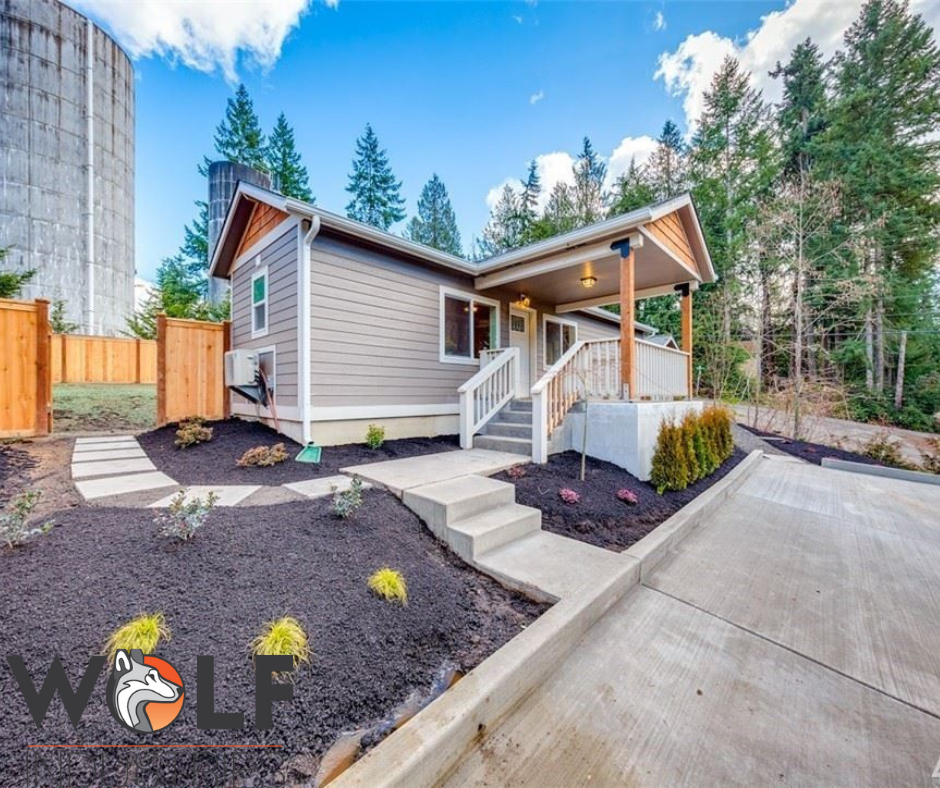Important Information Regarding The New WA State Building Code 2024 Update
All manufacturers of commercial and residential modular buildings, including tiny houses — please read these documents.
See Update From L& I
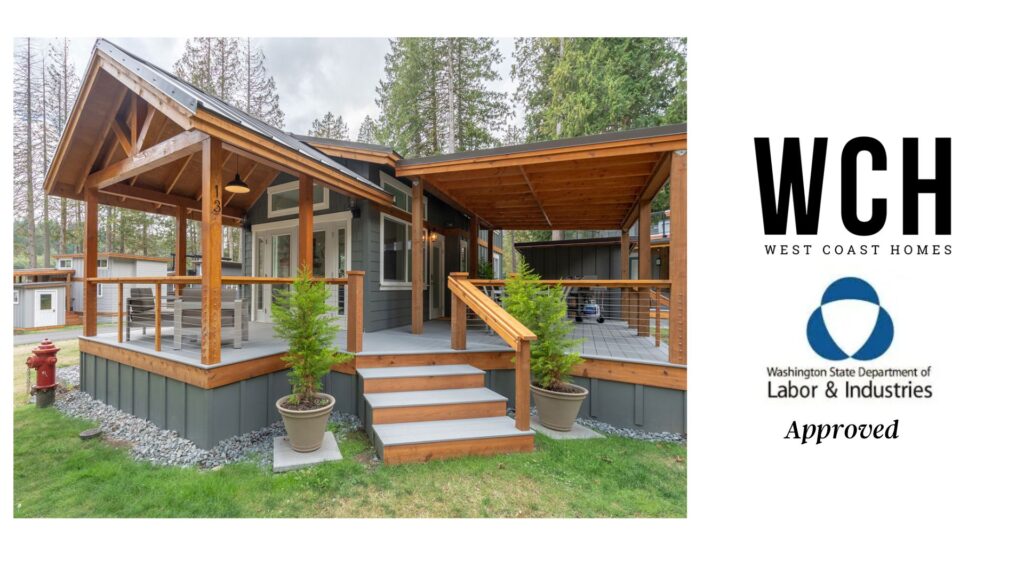
Wahington State Adopts Appendix AQ Tiny House
Washington state allows tiny houses, but it is important to know the process the state allows. The state has amended and adopted Appendix AQ Tiny House to be effective February 1st, 2021. Appendix AQ Tiny Houses refers to tiny houses on a foundation, 400 square feet or less. Appendix AQ Tiny House has been adopted on a state level, it will be up to the local jurisdictions to adopt it as well.
SBCC Building Codes
The anticipated effective date for the 2018 codes was originally July 1, 2020. Due to COVID-19, the Governor issued a proclamation extending this date.
State Codes, Regulations & Guidelines
Jurisdictions may use Appendix AQ Tiny House as a model code to adopt, reference, or amend. Builders or even jurisdictions that have not adopted the 2018 IRC or the Appendix, can seek approval ”on a project basis through the alternative materials and designs provision” in the IRC.
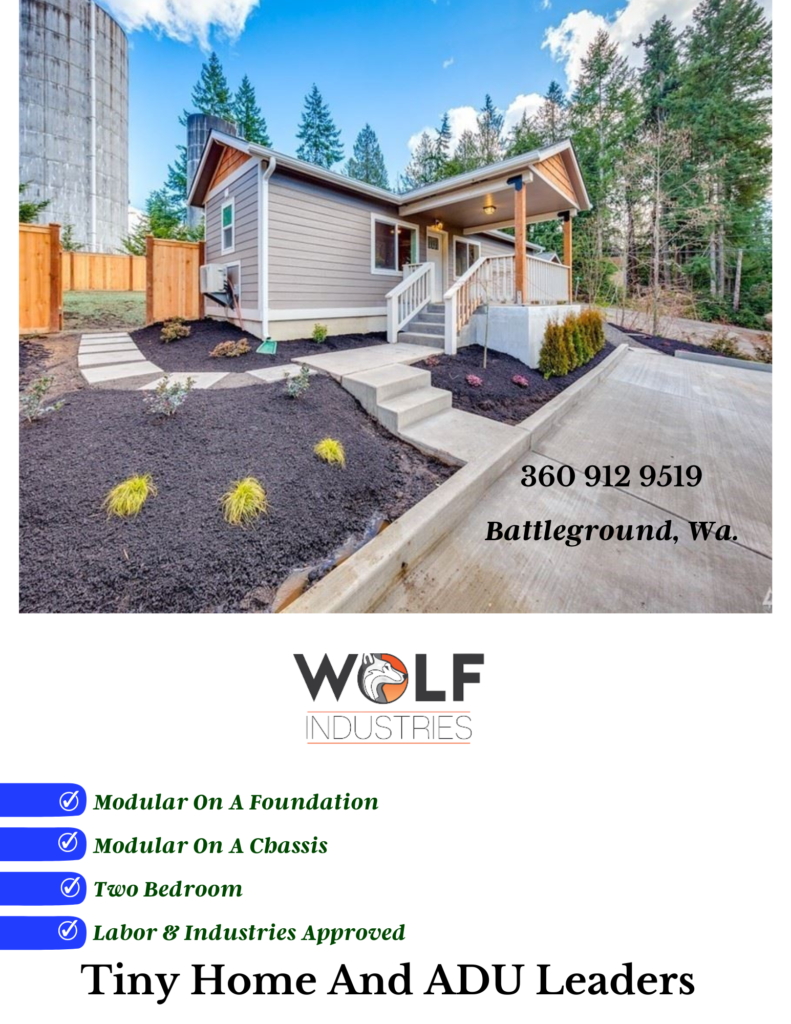
Factory-Built Housing And Commercial Structures,
Regulating Installation Of—Definitions:
RCW 43.22.450
NOTES:
WAC 51-51-60104: Appendix Q Tiny Houses
Do Your Own Personal Due Diligence: Is It Legal Where You Want To Place The Tiny House?
To avoid problems after you purchase your home, do extensive research, and personally speak to the jurisdiction you are going to be placing the tiny house in. There have been many incidents where a person was not allowed to live in the tiny house after they purchased it because they worked with an out-of-state builder, or even a Wa. state builder that did not know the process. These were devastating incidents and can be avoided.
Washington Inspection And Certification: Labor & Industries Regulates This
Labor & Industries shall have the authority to delegate all or part of its duties of inspection to a local enforcement agency or a qualified inspection agency. Qualified inspection agencies shall have adequate equipment to perform the required inspections and shall employ experienced personnel with appropriate certifications and knowledge for the inspections being performed. Certification by the international code council be recognized as meeting this last requirement.
Washington State House Bill 1486
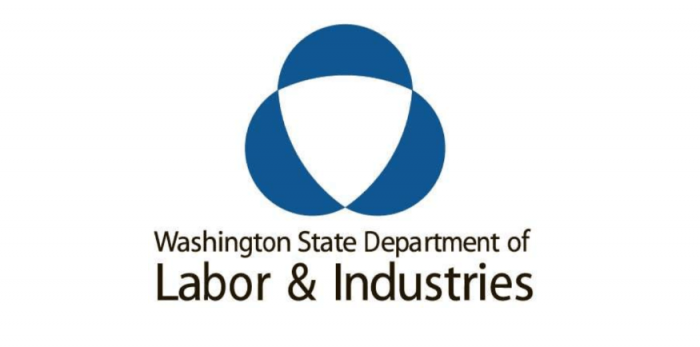
Washington State Labor And Industries
The Following Sourced From The Washington State Department Of Labor And Industries’ Website
About Tiny Houses
A tiny house is a dwelling that may be built on wheels and is no larger than 400 square feet, including a kitchen, bathroom, and sleeping/living area, and must be built to the Washington State Building Code. The approval process for a tiny house depends on where it’s built.
On this page, you can determine whether you need the approval of construction plans and inspections from L&I or the local building department where the house is being built.
- If you are building a tiny house on the site where it will be occupied and used, then you do not need to read any further: Contact your local building department. You may also need an L&I electrical inspection.
- If you’re building a structure with wheels, that’s not a tiny house as described above, then you may be building a recreational vehicle or park model. We inspect and regulate these units. You will need to contact your local building department to find out where it can be located or placed. See our bulletin for additional clarification on units L&I regulates.
- If you’re purchasing a manufactured home of any size, including a tiny manufactured home, then you will need to contact your local building department to find out where it can be located.
- If you’re building a tiny house somewhere OTHER than where it will be occupied and used, then see the Building a Tiny House tab.
Next, see the building a tiny house tab.
Building A Tiny House
L&I is the building department for the construction of tiny houses that are built at offsite locations, such as a factory or even a back yard. L&I reviews plans and inspections for tiny houses built offsite from where they will be placed.
NOTE: The design of your tiny house must also meet local building department criteria. Contact your local building department for their requirements and permit information.
To get a tiny house approved:
First, Download and review the tiny house information packet. It includes the standards to which you need to design, plan, and build your tiny house.
We will need 3 copies of your plans. Plans must be stamped by a Washington professional engineer (PE) or architect.
Next, fill out these applications:
- Tiny House Plan Approval & Insignia Request form (F623-039-000): This is your basic application and gets the insignia for the L&I inspector to place on your tiny house. The insignia is also important when talking with your local building department when you place the residence.
- Notification to Local Enforcement Agency (F623-013-000): This is included with a copy of your plan that is sent to the local building department upon L&I approval.
Finally, include payment of $775.00 for plan review and insignia. We will notify you if we need more information or when your plans are approved.
Mail the completed packet to:
Department of Labor & Industries
Factory Assembled Structures
P.O. Box 44430
Olympia WA 98504-4430
You can also submit your plans at your local L&I office, and pay the fee by cash, check, money order, or credit/debit card.
Because of the large number of requests, it can take several months for L&I to review plans. We will notify you if we need more information or if your plans have been approved.
Next, see the do the work tab.
Do The Work
Once plans for your tiny house are approved, you can start work.
Some important notes about licensing requirements:
When you build a tiny house there are several registration and licensing issues you need to be aware of and consider.
- You may need to be a registered general contractor depending on where you are going to work on a tiny house, and what duties you are performing. Contact L&I’s contractor’s program to find out the requirements for your situation.
- All plumbing must be installed by a Washington state-licensed residential or commercial plumber.
- All electrical work must be performed by a Washington State licensed electrical contractor and licensed electricians. You will need to get an L&I electrical permit to connect your house to power.
There are exceptions for homeowners doing electrical and plumbing work on their own house. Please contact L&I’s plumbing program and electrical program to determine the licensing requirements for your situation.
Note: Local building permits will be required for everything from the tiny house’s foundation, installation, and its location on a property. Remember to contact your local building official for more information.
Next, see the get inspected tab.
Get Inspected
You will need to have your tiny house inspected several times by L&I as you complete certain stages of construction. You must contact us using either an in-state or out-of-state inspection request form before covering any work on the house. Our inspector will contact you to confirm an appointment.
When you need an inspection depends on when you complete the stages of construction shown on the form. This can include:
- Floor.
- Plumbing.
- Electrical.
- Frame.
- Mechanical.
- Energy Code.
- Final.
Be ready for the inspection. If you’ve requested an inspection and you’re not ready, you will still be charged. If the inspector must return to the location, you will be charged additional fees.
Contact L& I
FA**@ln*.gov
1-800-705-1411 Option 3
Mailing address
Washington State Department of Labor & Industries
PO Box 44430
Olympia, WA 98504-4430
Location
7273 Linderson Way SW
Tumwater, WA 98501
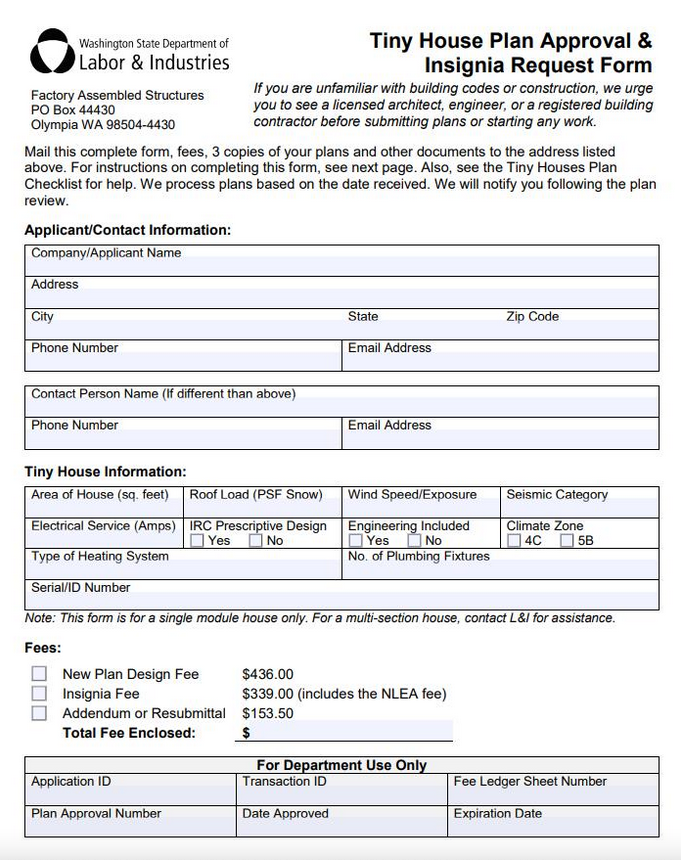
Tiny House Plan Approval And Insignia Request Form
Washington RCO 36.01.225 Allows Park Models And Travel Trailers To Be Used As A Residence In A RV Or Mobile Home Community
Authority to regulate placement or use of homes—Regulation of manufactured homes—Restrictions on location of manufactured/mobile homes and entry or removal of recreational vehicles used as primary residences.
Washington RCW 59.20.030: Definitions
Washington State Definition Of A Park Model
“Park model” means a recreational vehicle intended for permanent or semi-permanent installation and is used as a primary residence;
Washington State Definition Of A Travel Trailer
“Recreational vehicle” means a travel trailer, motor home, truck camper, or camping trailer that is primarily designed and used as temporary living quarters is either self-propelled or mounted on or drawn by another vehicle, is transient, is not occupied as a primary residence, and is not immobilized or permanently affixed to a mobile home lot.
Washington Tiny House Bill 5383: Effective July 28th, 2019
Tiny House Bill 5383, which became effective on July 28th, 2019 defines tiny homes and mandated that the building code council write building codes for tiny homes. Washington state has adopted Appendix Q Tiny Houses which relates to tiny homes on a foundation. The effective date is July 1st, 2021.
Tiny Houses On A Chassis
Tiny houses on wheels will go through the Modular inspection and approval process with L & I. This includes out-of-state manufacturers that sell to a consumer in Washington state.
A Tiny Home Constructed On A Chassis Must Be Approved By L&I As A Modular: Thurston, County
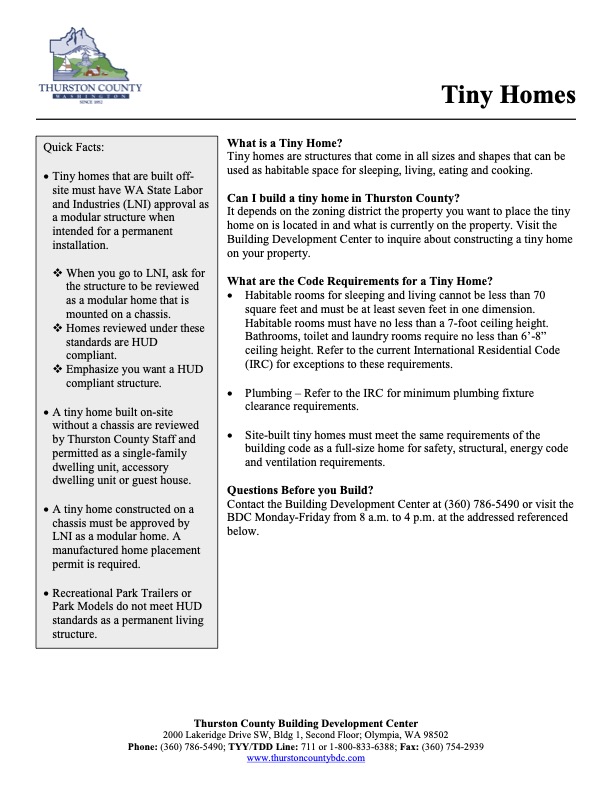
Tiny Houses Definition: Section Five HB 5383
“Tiny house” and “tiny house with wheels” means a dwelling to be used as permanent housing with permanent provisions for living, sleeping, eating, cooking, and sanitation built in accordance with the state building code.
Tiny Houses: SB 5383 – 2019-20
Related: Soap Lake, Wa. Has Become Tiny Friendly
Soap Lake, Wa. Adopted Chapter 17.25 into the Soap Lake Municipal Code
In 2016, the city council of Soap Lake, Wa. adopted chapter 17.25 into the Soap Lake Municipal Code to encourage single units and clusters of tiny homes on city lots in Soap Lake. The minimum requirement is 200 square feet and the maximum requirement is 1000 square feet. At this time, wheels need to be taken off, but they are very open to changes and willing to have an open conversation to make it work for everyone.
Soap Lake, Wa. Adopted Chapter 17.25 into the Soap Lake Municipal Code
Klickitat County: Tiny Homes as Temporary Housing vs. Permanent Dwelling Units
In Washington State, a tiny home with wheels and a chassis is actually called a park model recreational vehicle (PMRV) and is approved only for temporary/recreational use in the state. A tiny home/PMRV with its wheels taken off and mounted on a foundation will still be viewed as a park model recreational vehicle and its use will still be considered as “temporary/recreational” (and not approved as a permanent dwelling unit).
Exceptions in state law (RCW 35.21.684 and RCW 36.01.225), however, allow a PMRV to be used as a residence if it is located in a mobile home park, hooked up to utilities, and meets the other requirements of the applicable RCW.
Pierce County Tiny Homes
Division of Building, Safety, and Inspection for 2018 International Codes
Before you get started: Some HOA’s (Homeowner’s Association) or other community-based
governing collectives do not allow Tiny Homes. Pierce County’s code does not override these
restrictions so please verify prior to applying for a building permit.
What is it?
A “tiny home” is a small residence less than 400 square feet, not including a sleeping loft area,
placed on a permanent foundation and intended for use as a residence. They must contain a living
area, kitchen, and bathroom.
Tiny Homes in San Juan County
“Tiny Homes” have become a big part of popular culture and there are many
different types of “Tiny Homes”. San Juan County code does not have a definition
for “Tiny Home”, so in order to determine permit requirements and agencies with
permit jurisdiction, a proposed “Tiny Home” must be categorized as one of the
following.
San Juan County Department Of Community Development
Washington State Builders L& Industries Approved
Wolf Industries
Seattle Tiny Homes
Mint Tiny House Company
Stratford Building Corporation
West Coast Homes
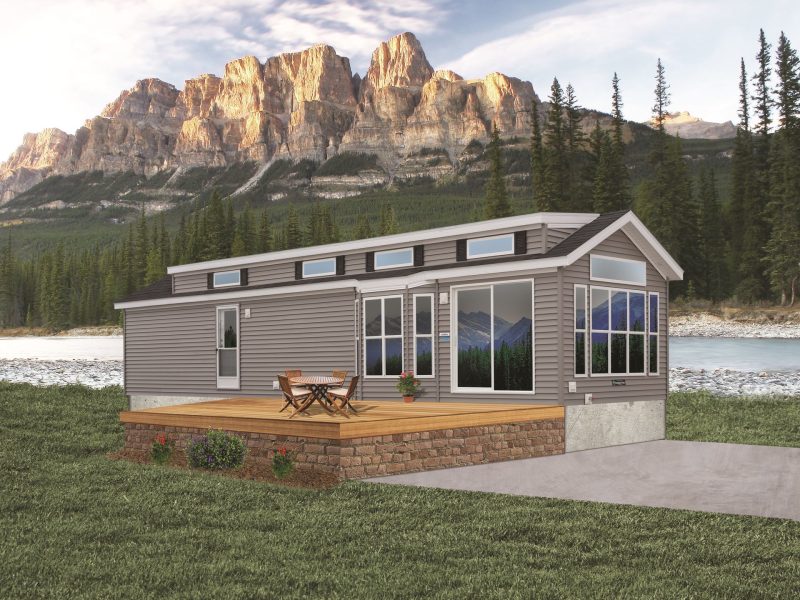
Washington State Dealer Of L& I Approved Manufacturers
Park Model Sells Several Park Models That Are L & I Approved
Ask For Joey Nelson
Oregon Has A Reciprocal Agreement With Wa. State L& I For Inspections
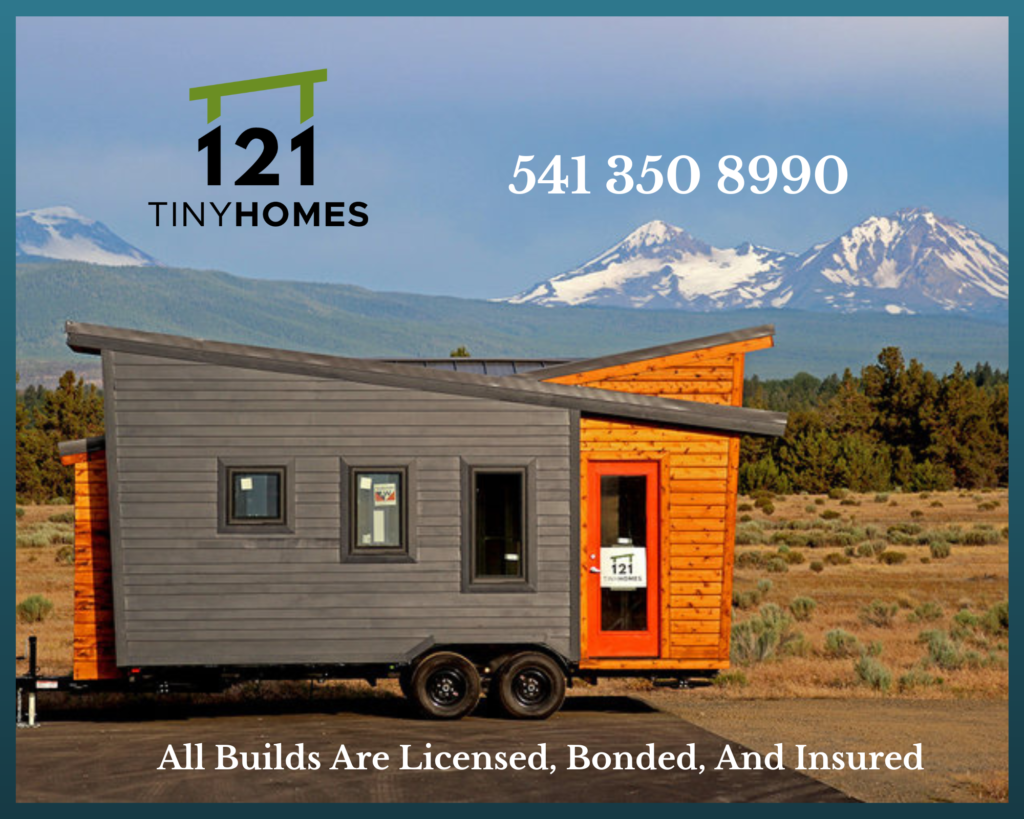
121 Tiny Homes is located in Bend, Oregon, and is an Oregon manufacturer that works with L& I for approval when they ship into Wa. state.
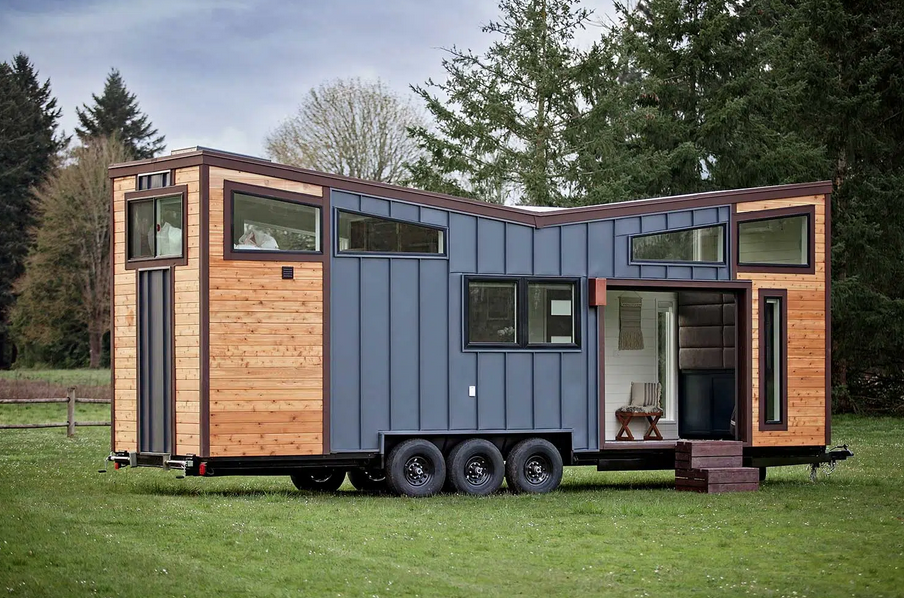
Tiny Heirloom is a Oregon manufacturer that works with L& I for approval when they ship into Wa. state.
Tiny Houses On Wheels Allowed As ADUs In Port Townsend
Source- City Of Port Townsend, Wa; Starting on July 1, 2023, per Ordinance 3306, Tiny Houses on Wheels (THOWs) will be permitted as Accessory Dwelling Units (ADU), subject to the requirements of Port Townsend Municipal Code 17.58.030.
An ADU is a dwelling unit that is accessory to an existing primary residence.
This document is specific to THOWs as ADUs, where up to 2 THOWs may be placed on a lot with an existing
single-family residence. For information on how to establish a Tiny House on Wheels Community with up
to 12 THOWs, please see our THOW Community handout. For general information about ADUs, please see
our ADU handout.
Learn More
List Of L& I Approved Licensed Professsionals For FAS Program
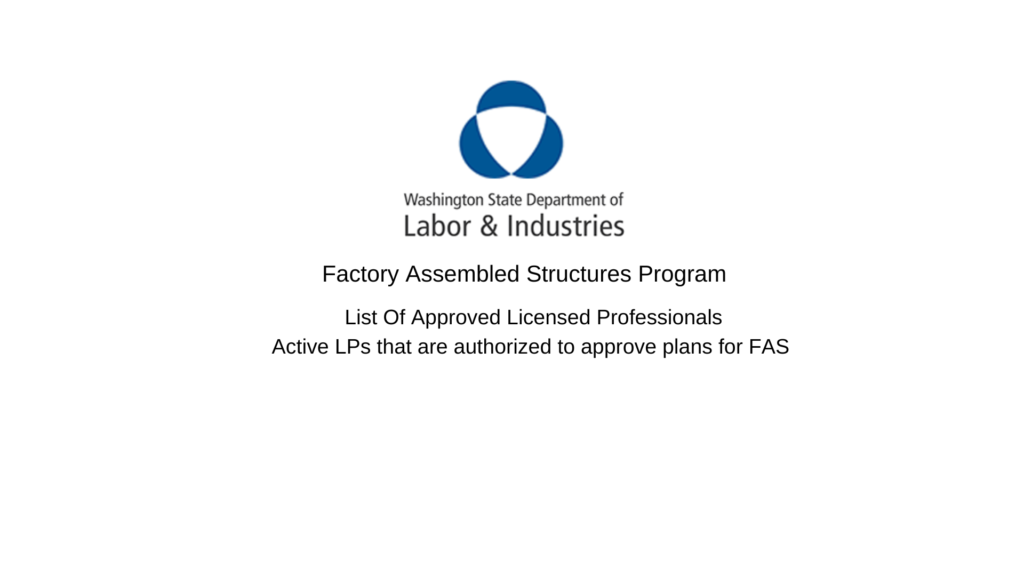
Tiny House Alliance USA Editor
The Future Of Tiny Is Now!
Janet Thome Founder And President
ja***@ti******************.org
509 345 2013


